高中学业水平考试英语模拟题
- 格式:doc
- 大小:47.50 KB
- 文档页数:7
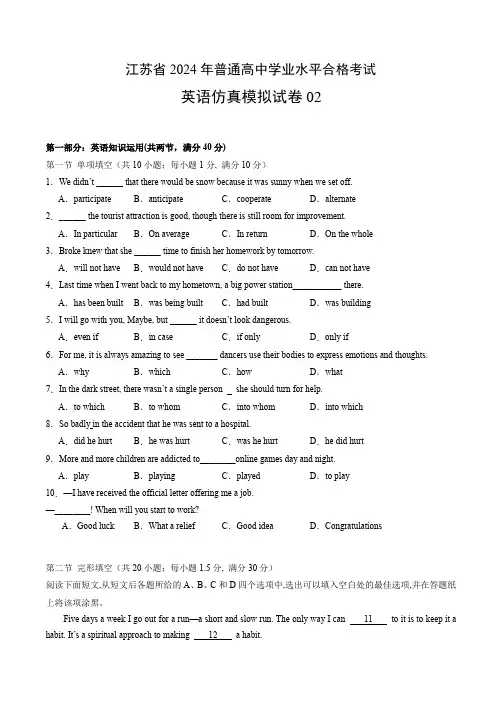
江苏省2024年普通高中学业水平合格考试英语仿真模拟试卷02第一部分:英语知识运用(共两节,满分40分)第一节单项填空(共10小题;每小题1分, 满分10分)1.We didn’t ______ that there would be snow because it was sunny when we set off.A.participate B.anticipate C.cooperate D.alternate2.______ the tourist attraction is good, though there is still room for improvement.A.In particular B.On average C.In return D.On the whole3.Broke knew that she ______ time to finish her homework by tomorrow.A.will not have B.would not have C.do not have D.can not have4.Last time when I went back to my hometown, a big power station___________ there.A.has been built B.was being built C.had built D.was building5.I will go with you, Maybe, but ______ it doesn’t look dangerous.A.even if B.in case C.if only D.only if6.For me, it is always amazing to see _______ dancers use their bodies to express emotions and thoughts.A.why B.which C.how D.what7.In the dark street, there wasn’t a single person she should turn for help.A.to which B.to whom C.into whom D.into which8.So badly in the accident that he was sent to a hospital.A.did he hurt B.he was hurt C.was he hurt D.he did hurt9.More and more children are addicted to________online games day and night.A.play B.playing C.played D.to play10.—I have received the official letter offering me a job.—________! When will you start to work?A.Good luck B.What a relief C.Good idea D.Congratulations第二节完形填空(共20小题;每小题1.5分, 满分30分)阅读下面短文,从短文后各题所给的A、B、C和D四个选项中,选出可以填入空白处的最佳选项,并在答题纸上将该项涂黑。
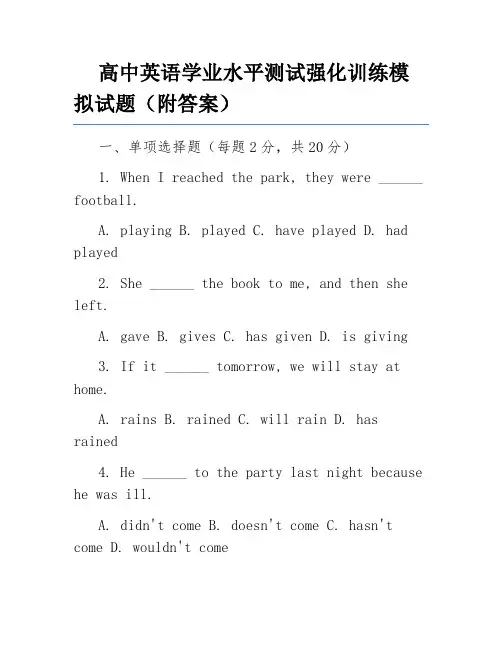
高中英语学业水平测试强化训练模拟试题(附答案)一、单项选择题(每题2分,共20分)1. When I reached the park, they were ______ football.A. playingB. playedC. have playedD. had played2. She ______ the book to me, and then she left.A. gaveB. givesC. has givenD. is giving3. If it ______ tomorrow, we will stay at home.A. rainsB. rainedC. will rainD. has rained4. He ______ to the party last night because he was ill.A. didn't comeB. doesn't comeC. hasn't comeD. wouldn't come5. My mother often tells me ______ late for school.A. not to beB. not beingC. notD. being6. The teacher asked the students ______ quietly during the exam.A. workB. worked C) working D) worked7. I wish I ______ to the concert last night.A. have goneB. went C) had gone D) would go8. You ______ finish your homework before you go out.A. can B) could C) may D) might9. He ______ to bed late last night, so he felt tired this morning.A. wentB. has gone C) had gone D) goes10. We all thought that he ______ the job, but he didn't.A. will get B) got C) would get D) has got二、多项选择题(每题3分,共30分)11. Choose the correct words to complete the sentence.I ______ my keys. Can you help me find them?A. have lostB. lostC. had lostD. amlosing12. Choose the correct words to complete the sentence.If it ______ tomorrow, we ______ stay at home.A. rains; willB. rains; doC. doesn't rain; won'tD. doesn't rain; don't13. Choose the correct words to complete the sentence.I wish I ______ to the concert last night. It sounded wonderful.A. have goneB. went C) had gone D) would go14. Choose the correct words to complete the sentence.The teacher asked the students ______quietly during the exam.A) working B) worked C) to work D) worked15. Choose the correct words to complete the sentence.You ______ finish your homework before you go out.A) can B) could C) may D) might三、完形填空(每题2分,共20分)Once upon a time, there was a lazy cat. One day, the cat saw a mouse running across the street. 16. The cat thought to itself, "If I 17_ catch that mouse, I will have a delicious meal." So, the cat 18_ and started to chase the mouse. However, the mouse was 19_ and quickly 20_ away from the cat. In the end, the cat couldn't catch the mouse and went home empty-handed.16. A. quietly B. slowly C. quickly D.loudly17. A. can B. could C. shall D. will18. A. sat B. lay C. stood D. walked19. A. slow B. lazy C. fast D. careful20. A. ran B. walked C. jumped D. crawled四、阅读理解(每题2分,共20分)Passage 1:Last weekend, my family and I went to the countryside for a day trip. The countryside was beautiful, with green fields and blue skies. We saw many animals, including cows, pigs, and chickens. We also saw many plants, such as tomatoes, potatoes, and apples. It was a great day, and we had a lot of fun.Questions:21. Why did the family go to the countryside?A. To visit their relatives.B. To go for a day trip.C. To buy some vegetables.D. To see their friends.22. What animals did they see in the countryside?A. Cows, pigs, and cats.B. Cows, pigs, and chickens.C. Cows, pigs, and dogs.D. Cows, pigs, and birds.Passage 2:Tom is a tall man. He is 6 feet 2 inches tall. His height is much taller than average. Tom is proud of his height. He can reach things on high shelves without a stepstool. He can also play basketball well because of his height. However, sometimes his height can be a problem. For example, when he goes to a small car, he has to bend his head down to avoid hitting it.Questions:23. How tall is Tom?A. 5 feet 2 inches.B. 6 feet 2 inches.C. 6 feet 4 inches.D. 7 feet 2 inches.24. What is Tom proud of?A. His height.B. His eyesight.C. His basketball skills.D. His ability to drive a car.五、短文改错(每题2分,共10分)Please read the following passage andcorrect the errors.Last week, my family and I went to the beach for a vacation. The weather was sunny and warm. We played games on the sand and swam in the ocean. We also had a picnic lunch. In the afternoon, we went for a walk on the pier and watched the sunset. It was a great day.Your corrected passage:____________________________________________ _____________六、翻译(每题3分,共15分)1. 请翻译以下句子:If you have any questions, you can ask the teacher.2. 请翻译以下句子:She is a good teacher, and she always helps her students.3. 请翻译以下句子:He likes to read books, especially science fiction novels.4. 请翻译以下句子:The sun sets in the west and rises in the east.5. 请翻译以下句子:You should study hard and listen carefully in class.参考答案:一、单项选择题1. A2. A3. C4. C5. A6. C7. C8. A9. A 10. C二、多项选择题11. A 12. C 13. C 14. C 15. A三、完形填空16. B 17. D 18. B 19. C 20. A四、阅读理解21. B 22. B 23. B 24. A五、短文改错Last week, my family and I went to the beach for a vacation. The weather was sunny and warm. We played games on the sand and swam in the ocean. We also had a picnic lunch. In the afternoon, we went for a walk on the pier and watched the sunset. It was a great day.六、翻译1. 如果你有任何问题,你可以问老师。
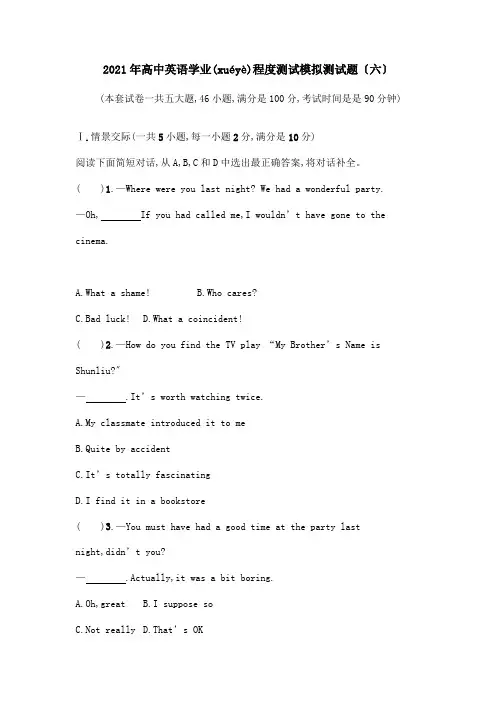
2021年高中英语学业(xuéyè)程度测试模拟测试题〔六〕 (本套试卷一共五大题,46小题,满分是100分,考试时间是是90分钟) Ⅰ.情景交际(一共5小题,每一小题2分,满分是10分)阅读下面简短对话,从A,B,C和D中选出最正确答案,将对话补全。
( )1.—Where were you last night? We had a wonderful party. —Oh, If you had called me,I wouldn’t have gone to the cinema.A.What a shame!B.Who cares?C.Bad luck!D.What a coincident!( )2.—How do you find the TV play “My Brother’s Name is Shunliu?〞—.It’s worth watching twice.A.My classmate introduced it to meB.Quite by accidentC.It’s totally fascin atingD.I find it in a bookstore( )3.—You must have had a good time at the party lastnight,didn’t you?—.Actually,it was a bit boring.A.Oh,greatB.I suppose soC.Not reallyD.That’s OK( )4.—? You look down today,Tom.—I got a “C〞 again in the English exam.A.What’s upB.How are youC.How’s everythingD.What do you think of the English exam( )5.—Sorry,I can’t return your book today.I am only halfway through it.—.I have plenty of other books to read.A.Take it easyB.No wonderC.Take your timeD.No doubtⅡ.阅读(yuèdú)理解(一共15小题,每一小题2分,满分是30分)阅读以下短文,掌握其大意,然后从每一小题所给的A,B,C和D中选出最正确选项。
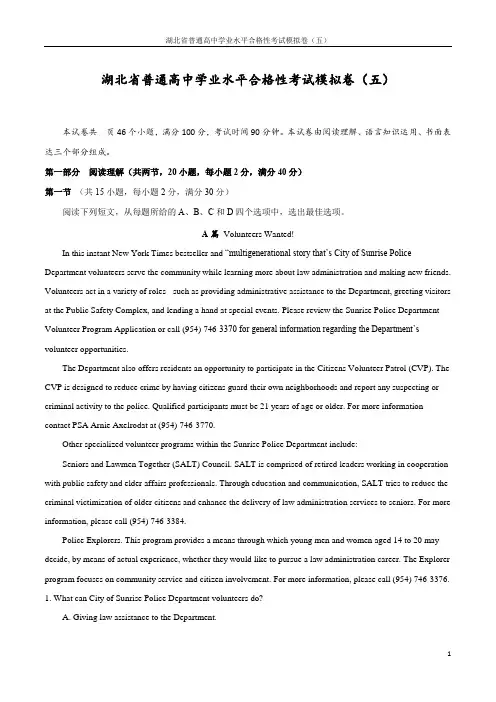
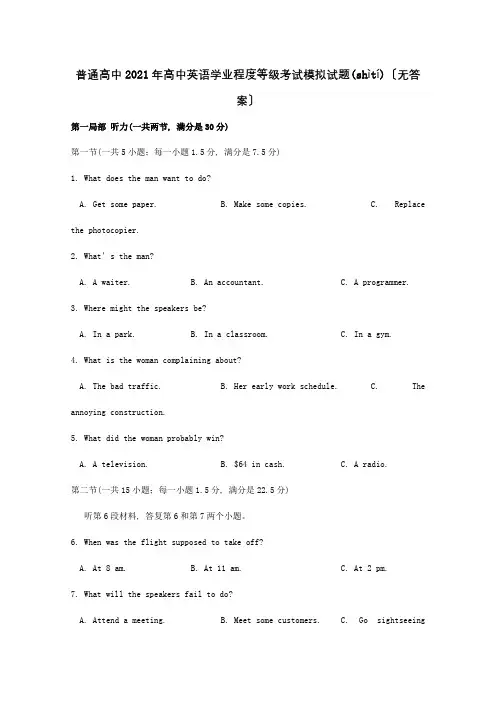
普通高中2021年高中英语学业程度等级考试模拟试题(shìtí)〔无答案〕第一局部听力(一共两节, 满分是30分)第一节(一共5小题;每一小题1.5分, 满分是7.5分)1. What does the man want to do?A. Get some paper.B. Make some copies.C. Replace the photocopier.2. What’s the man?A. A waiter.B. An accountant.C. A programmer.3. Where might the speakers be?A. In a park.B. In a classroom.C. In a gym.4. What is the woman complaining about?A. The bad traffic.B. Her early work schedule.C. The annoying construction.5. What did the woman probably win?A. A television.B. $64 in cash.C. A radio.第二节(一共15小题;每一小题1.5分, 满分是22.5分)听第6段材料, 答复第6和第7两个小题。
6. When was the flight supposed to take off?A. At 8 am.B. At 11 am.C. At 2 pm.7. What will the speakers fail to do?A. Attend a meeting.B. Meet some customers.C. Go sightseeingin the city.听第7段材料. 答复(dá fù)第8和第9题两个小题。
8. What are the speakers doing?A. Baking a cake.B. Making a pizza.C. Eating some popcorn.9. What is the probable relationship between the speakers?A. Father and daughter.B. Husband and wife.C. Brother and sister.第8段材料, 答复第10至12三个小题。
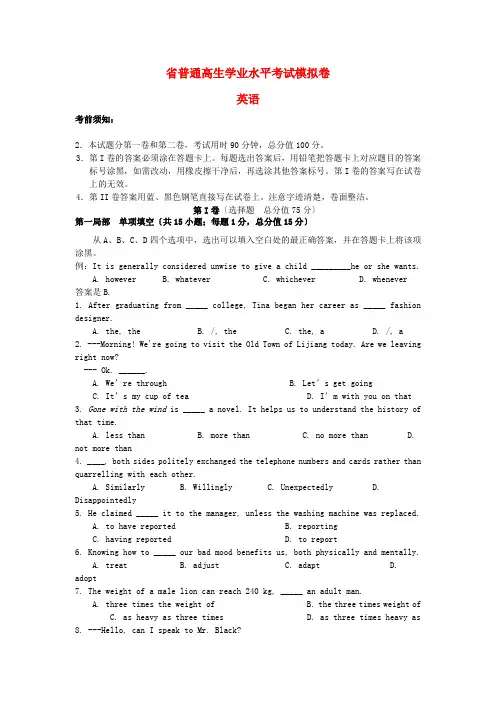
省普通高生学业水平考试模拟卷英语考前须知:2.本试题分第一卷和第二卷,考试用时90分钟,总分值100分。
3.第I卷的答案必须涂在答题卡上。
每题选出答案后,用铅笔把答题卡上对应题目的答案标号涂黑,如需改动,用橡皮擦干净后,再选涂其他答案标号。
第I卷的答案写在试卷上的无效。
4.第II卷答案用蓝、黑色钢笔直接写在试卷上。
注意字迹清楚,卷面整洁。
第I卷〔选择题总分值75分〕第一局部单项填空〔共15小题;每题1分,总分值15分〕从A、B、C、D四个选项中,选出可以填入空白处的最正确答案,并在答题卡上将该项涂黑。
例:It is generally considered unwise to give a child _________he or she wants.A. howeverB. whateverC. whicheverD. whenever答案是B.1. After graduating from _____ college, Tina began her career as _____ fashion designer.A. the, theB. /, theC. the, aD. /, a2. ---Morning! We're going to visit the Old Town of Lijiang today. Are we leavingright now?--- Ok. ______.A. We’re throughB. Let’s get goingC. It’s my cup of teaD. I’m with you on that3. Gone with the wind is _____ a novel. It helps us to understand the history ofthat time.A. less thanB. more thanC. no more thanD.not more than4. ____, both sides politely exchanged the telephone numbers and cards rather than quarrelling with each other.A. SimilarlyB. WillinglyC. UnexpectedlyD. Disappointedly5. He claimed _____ it to the manager, unless the washing machine was replaced.A. to have reportedB. reportingC. having reportedD. to report6. Knowing how to _____ our bad mood benefits us, both physically and mentally.A. treatB. adjustC. adaptD.adopt7. The weight of a male lion can reach 240 kg, _____ an adult man.A. three times the weight ofB. the three times weight ofC. as heavy as three timesD. as three times heavy as8. ---Hello, can I speak to Mr. Black?---Sorry, madam. He _____ a lecture in the hall.A. will giveB. givesC. is givingD. has given9. _____, and I believe you will realize your dream.A. Make a little bit more effortB. Making a little bit more effortC. To make a little bit more effortD. If you make a little bit more effort10. Success and achievement are different. Success is how you are viewed by others,_____ achievement is something you do yourself.A. forB. soC. whileD. and11. ----I don’t mind telling you the truth.---You _____.I’m not asking you for it.A. needn’tB. mustn’tC. can’tD.should’t12. The Jeremy Lin story, _____ is popular on the Internet, has attracted worldwideattention.A. whomB. whichC. whereD. that13. Tim couldn’t _____ how to do the experiment until the teacher showed it to him.A. carry outB. take outC. figure outD. turn out14. Look! How busy the building workers are! The houses ________ by them will be completed next week.A. builtB. being builtC. to buildD. to be built15. In his hurry he didn’t make _____ clear when and where the meeting would be held.A. thatB. thisC. theseD. it第二局部完形填空〔共20小题;每题1分,总分值20分〕阅读下面的短文,掌握其大意,然后从16—35各题所给的四个选项〔A、B、C和D〕中,选出最正确答案,并在答题卡上将该项涂黑。
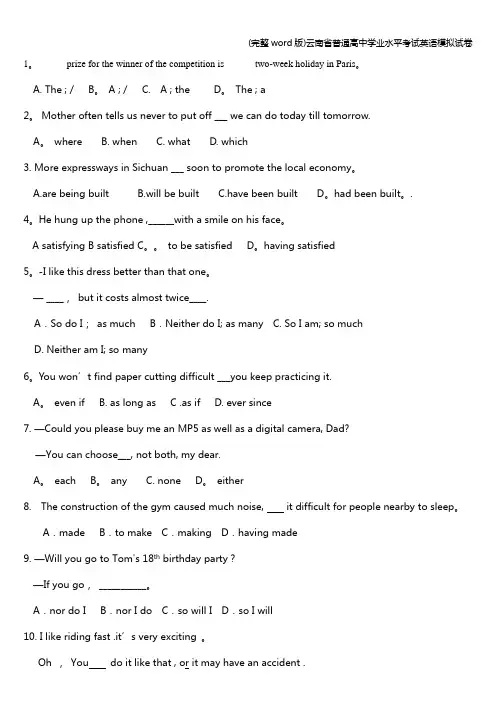
1。
______prize for the winner of the competition is ______two-week holiday in Paris。
A. The ; / B。
A ; / C. A ; the D。
The ; a2。
Mother often tells us never to put off ___ we can do today till tomorrow.A。
where B. when C. what D. which3.More expressways in Sichuan ___ soon to promote the local economy。
A.are being builtB.will be builtC.have been built D。
had been built。
. 4。
He hung up the phone ,______with a smile on his face。
A satisfyingB satisfied C。
to be satisfied D。
having satisfied5。
-I like this dress better than that one。
6。
You won’t find paper cutting difficult ___you keep practicing it.A。
even if B. as long as C .as if D. ever since7. —Could you please buy me an MP5 as well as a digital camera, Dad?—You can choose___, not both, my dear.A。
each B。
any C. none D。
eitherA.made B.to make C.making D.having made9. —Will you go to Tom's 18th birthday party?—If you go,___________。
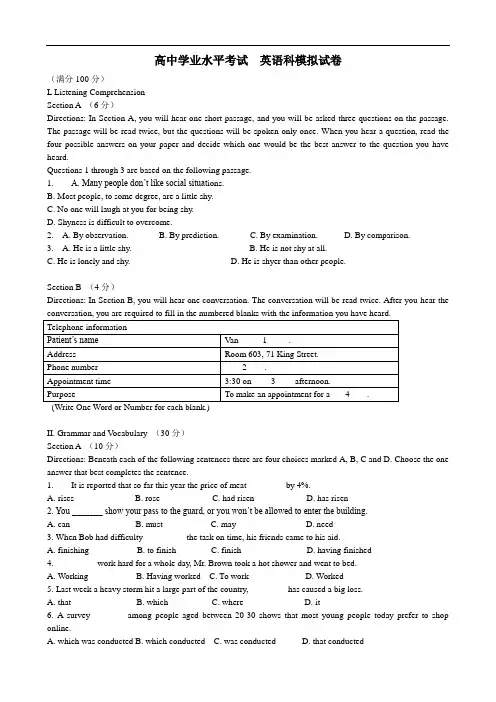
高中学业水平考试 英语科模拟试卷 (满分100分) L Listening Comprehension Section A (6分) Directions: In Section A, you will hear one short passage, and you will be asked three questions on the passage. The passage will be read twice, but the questions will be spoken only once. When you hear a question, read the four possible answers on your paper and decide which one would be the best answer to the question you have heard. Questions 1 through 3 are based on the following passage. 1. A. Many people don’t like social situations. B. Most people, to some degree, are a little shy. C. No one will laugh at you for being shy. D. Shyness is difficult to overcome. 2. A. By observation. B. By prediction. C. By examination. D. By comparison. 3. A. He is a little shy. B. He is not shy at all. C. He is lonely and shy. D. He is shyer than other people.
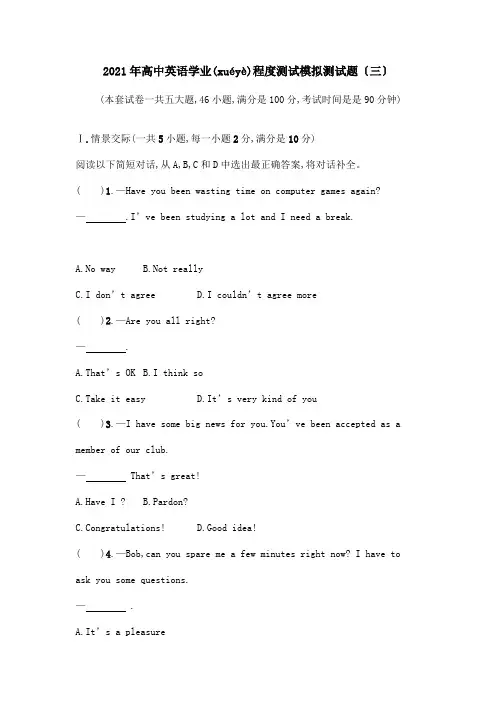
2021年高中英语学业(xuéyè)程度测试模拟测试题〔三〕 (本套试卷一共五大题,46小题,满分是100分,考试时间是是90分钟) Ⅰ.情景交际(一共5小题,每一小题2分,满分是10分)阅读以下简短对话,从A,B,C和D中选出最正确答案,将对话补全。
( )1.—Have you been wasting time on computer games again? —.I’ve been studying a lot and I need a break.A.No wayB.Not reallyC.I don’t agreeD.I couldn’t agree more( )2.—Are you all right?—.A.That’s OKB.I think soC.Take it easyD.It’s very kind of you( )3.—I have some big news for you.You’ve been accepted as a member of our club.—That’s great!A.Have I ?B.Pardon?C.Congratulations!D.Good idea!( )4.—Bob,can you spare me a few minutes right now? I have to ask you some questions.— .A.It’s a pleasureB.Ask,pleaseC.Help yourselfD.Yes,go ahead( )5.—Mike, would you mind not wearing those old jeans? They look terrible.—A.Ok,I’ll put on another pairB.Sure,I will do it right awayC.Sorry,I won’t be aloneD.Alright,I’ll do them in a minuteⅡ.阅读(yuèdú)理解(一共15小题,每一小题2分,满分是30分)阅读以下短文,掌握其大意,然后从每一小题所给的A,B,C和D项中选出最正确选项。
高中学业水平考试英语模拟题(2)原创 周村教研室 注意事项: 1.本试题分为第Ⅰ卷和第Ⅱ卷两部分。第Ⅰ卷8页为选择题,60分;第Ⅱ卷4页为非选择题,40分;共100分。考试时间为90分钟。 2.答卷前务必将自己的姓名、考号、考试科目涂写在答题卡上。考试结束时,试卷和答题卡一并收回。 3.第Ⅰ卷每题选出答案后,都必须2B铅笔把答题卡上对应题目的答案标号(A、B、C或D)涂黑。如需改动,必须先用橡皮擦干净,再改涂其它答案。 第一部分:听力测试 (共两节,满分20分) 做题时,先将答案划在试卷上。录音内容结束后,你将有两分钟的时间将试卷上的答案转涂到答题卡上。(略) 第二部分:英语知识运用(共两节,满分20分) 第一节:单项填空(共10小题;每小题1分,满分10分) 21.—Thank you so much for the book you send me. —____________. A. No thanks B. I’m glad you like it. C. Please don’t say so D. No, it’s not so good. 22. He was elected ______ President of our country for the second time in _____ year 2004. A. / ; a B. a; the C. / ; the D. the; the 23. The speech, ______ by a famous university professor, moved us very deeply. A. given B. give C. been given D. gave 24.—Why didn’t you come to the party, Bill? —Sorry, dear. But I really forgot where I was ______ to meet you. A. demanded B. imagined C. supposed D. guessed 25. I was doing my homework _____my mother called the phone. A. when B. which C. before D. that
26.Cut flowers will ______ several weeks if you put flower food in the water.
A. continue B. last C. protect D. insist 27. —Is there any _________ to the time that I can stay here?
—Yes, you must leave before she comes back. A. number B length C. limit D. matter 28 —Guess what? I have got A for my term paper. —Great! You ___ widely and put a lot of work into it.. A. must read B. must have read C. should have read D. could 29.When we got to the cinema, the film _____ for 20 minutes. A. had begun B. has been on C. had been on D. has begun 30.Whenever I wanted to_____ , my parents always encouraged me to work harder. A. go on B. turn on C. stay up D. give up 第二节:完形填空(共10小题;每小题1分,满分10分) 阅读下面短文,掌握其大意,然后从31―40各题所给的四个选项(A、B、C和D)中,选出能填入空白处的最佳答案,并在答题卡上将该项涂黑。 When you sit and watch TV programs hour after hour, do you ever think of what it may be doing to your health? More and more children are becoming overweight and near-sighted ___31___ they spend too much time in front of the telly. Also, they are growing less and less creative since watching TV doesn’t ___32___ any active thought Last week, the TV-Turnoff Organization began its Ninth ___33___ in the United States. The organization encourages people to play games, read books, lie under a tree, talk to family members and friends ___34___ watching TV. American school children spend, on average, 1,000 hours a year ___35___ TV—more time than they spend in school. That’s too much, say the doctors ___36___ organized this year’s TV-Turnoff Week. Doctors say that the ___37___ children watch television, the more overweight they may become. And the food children eat while they watch the television makes this weight ___38___ more serious. To keep healthy in body and mind, children need to take exercise, talk with friends and family, read, and ___39___ the world around them. Could you go a week without television? It might be _40___ for many TV lovers, but why not give it a try? 31. A. because B. until C. whether D. though 32. A. find B. need C. lose D. know 33 A. Day B. Week C. Month D. Year 34. A. together with B. because of C. lots of D. instead of 35. A. watched B. watches C. watching D. watch 36. A. whom B. whose C. which D. who 37. A. later B. earlier C. longer D. less 38. A. problem B. question C. thing D. lesson 39. A. explore B. invent C. take D. make 40. A. easy B. happy C. dangerous D. difficult 第三部分:阅读理解(共10小题;每小题2分,满分20分) 阅读下列短文,从每题所给的四个选项(A、B、C和D)中选最出佳选项,并在答题卡上将该项涂黑。 A We use both words and gestures to express our feelings, but the problem is that these words and gestures can be understood in different ways. It is true that a smile means the same thing in any language. So does laughter or crying. There are also a number of striking similarities in the way different animals show the same feelings. Dogs, tigers and humans, for example, often show their teeth when they are angry. This is probably because they are born with those behavior patterns. Fear is another emotion that is shown in much the same way all over the world. In Chinese and in English literature, a phrase like "he went pale and begin to tremble" suggests that the man is either very afraid or he has just got a very big shock. However, "he opened his eyes wide" is used to suggest anger in Chinese whereas in English it means surprise. In Chinese "surprise" can be described in a phrase like 'they stretched out their tongues!' Sticking out your tongue in English is an insulting gesture or expresses strong dislike. Even in the same culture, people differ in ability to understand and express feelings. Experiments in America have shown that women are usually better than men at recognizing fear,